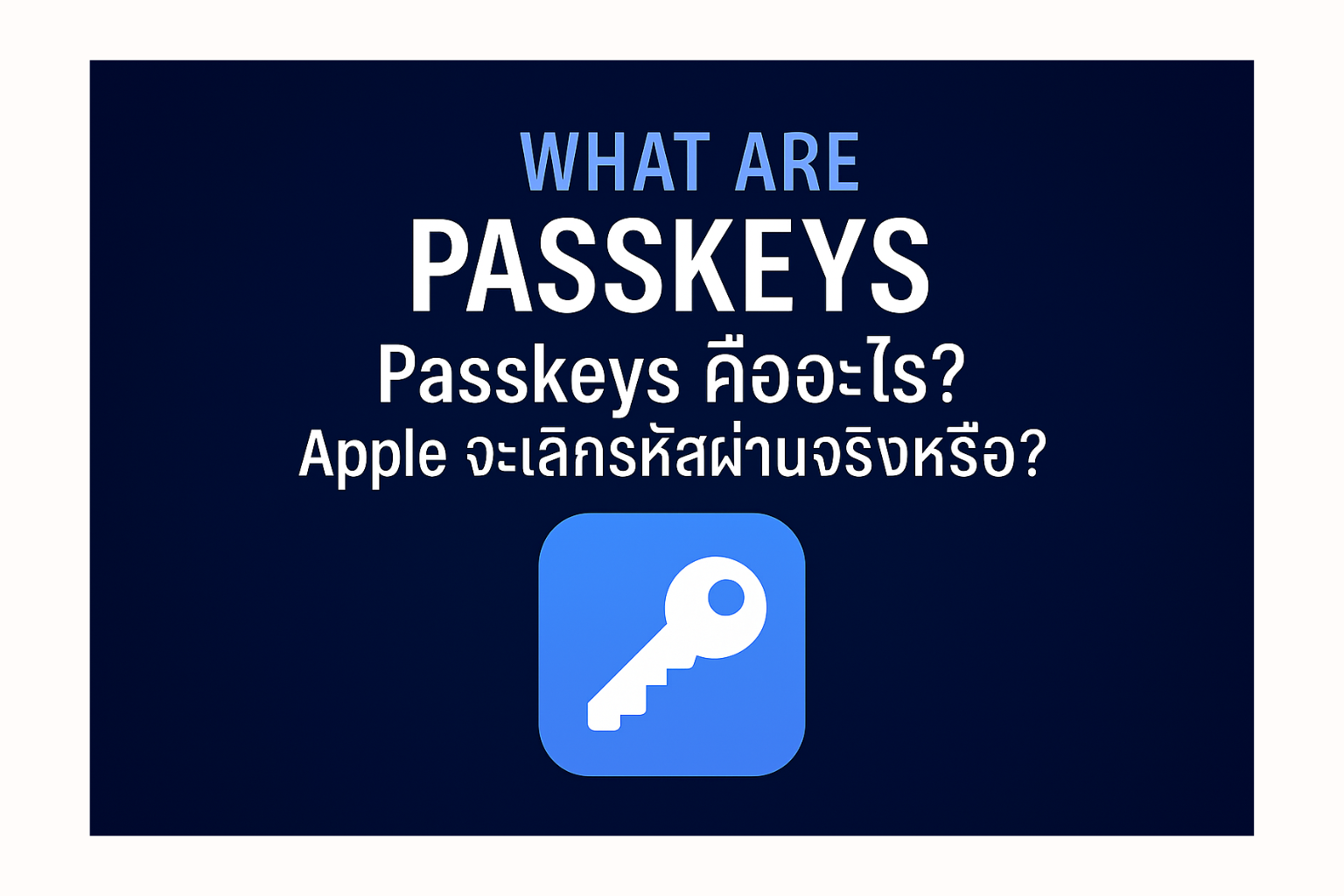The Passwordless World: What are Passkeys, and Can They Really Replace Passwords?
In our digital age, where we face increasingly sophisticated cyber threats, the familiar "password" has become a major vulnerability. No matter how complex we make them, passwords can still be stolen, hacked, or easily forgotten. Apple, as a leader in innovation and security, has introduced a technology called Passkeys as a new solution, aiming to ultimately "kill passwords."
What are Passkeys? The Future of Authentication
What are Passkeys? The Future of Authentication
Passkeys are a new authentication technology designed to replace traditional passwords. They rely on an open standard called WebAuthn (Web Authentication), developed by the FIDO Alliance and W3C. This offers a passwordless authentication method that is safer, simpler, and more user-friendly.
How Passkeys Work:
How Passkeys Work:
Passkeys use Public-Key Cryptography, which involves:
- A Private Key: Stored securely on your device (e.g., iPhone, iPad, Mac) and never leaves that device.
- A Public Key: Sent and stored on the website or service you want to log into.
When you want to log in with a Passkey, the system performs a check:
- On your device: You authenticate using biometrics (Face ID or Touch ID) or your device passcode.
- Key Matching: Your device uses its Private Key to create a digital signature that can be verified by the Public Key on the website's server. If the signature is valid, the login is successful without you having to type any password.
A key highlight of Passkeys is their synchronization via iCloud Keychain: when you create a Passkey on one Apple device, it's securely synced to your other Apple devices signed in with the same Apple ID. This allows you to access your accounts from any device within the Apple Ecosystem.
Why Are Passkeys Safer Than Traditional Passwords?
Why Are Passkeys Safer Than Traditional Passwords?
Passkeys are designed to address the critical weaknesses of passwords:
- 100% Phishing Resistant: Passkeys are created specifically for a particular website or service. They cannot be used on fake websites or phishing pages. Even if you're tricked into authenticating on a fake page, the Passkey won't work because it doesn't match the Public Key of the legitimate website.
- No Data Breaches: Since no password is ever stored on the website's server, there's no data for hackers to steal from a database breach.
- Resistant to Brute Force and Credential Stuffing Attacks: With no password to guess or reuse, these types of attacks become ineffective.
- Man-in-the-Middle Attack Protection: Because Passkeys use strong encryption and are tied to specific domains, they are much harder to intercept or spoof.
- No Need to Remember or Type: Reduces the risk of forgotten passwords, password reuse, or using easy-to-guess passwords.
Is Apple Really "Killing Passwords"?
Apple has clearly demonstrated a strong commitment to pushing Passkeys as the new standard for authentication, significantly reducing reliance on passwords. This represents a major step towards a truly passwordless world:
- Apple's Support: Apple is one of the pioneers and strong advocates for the Passkeys standard, enabling Passkeys to work seamlessly within the Apple ecosystem via iCloud Keychain.
- Cross-Platform Compatibility: Passkeys are not limited to the Apple Ecosystem. They are an open standard supported by Google, Microsoft, and the FIDO Alliance. This means you'll soon be able to use Passkeys to log in on Android or Windows devices, and vice versa.
- Ease of Use: The Passkey user experience is simple and intuitive. Just authenticate with Face ID or Touch ID, and you're logged in instantly, which is faster and more convenient than typing a password.
While passwords won't disappear overnight, the trend is clear: Passkeys will play an increasingly important role in the near future, gradually diminishing the necessity of traditional passwords.
Limitations and Considerations:
- Website/Service Adoption: The widespread use of Passkeys depends on how many websites and services adopt this technology.
- Device Management: If you lose a device storing your Passkeys, there might be different account recovery procedures (though these are also designed with security in mind).
- User Familiarity: Users might need time to understand and adapt to this new form of authentication.
Conclusion: Towards a New Era of Authentication
Passkeys are not just a new feature; they represent a major shift in how we log in and protect our personal data online. With superior security, ease of use, and strong support from tech giants, Apple is leading us towards an era where accessing digital services is truly simple, secure, and free from the complexities of traditional passwords. "Killing passwords" may no longer be a distant dream.

